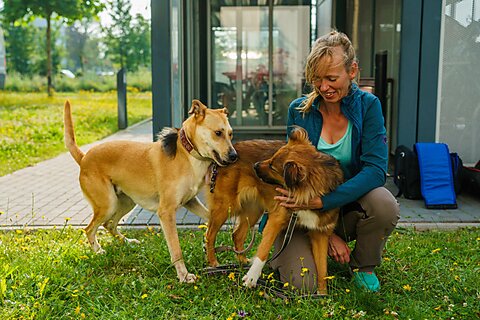Over the years, several so-called midlevel human health care professions have emerged organically, responding to a growing demand for health care services for which, in many cases, providers with doctorate degrees are overqualified. Similar innovations may soon occur in veterinary health care delivery.
Research commissioned by MARS Veterinary Health, a global veterinary health company, in 2023 projects a significant increase in pet health care spending over the next decade. The researcher expects the increase, estimated to be three to four percent beyond inflation, to drive a surge in demand for veterinary services. He anticipates that this demand will require an additional 55,000 veterinarians by 2030, highlighting the need for proactive workforce planning in the veterinary health sector.
Even with the new veterinary graduates expected over the next 10 years, a shortage of up to 24,000 companion-animal veterinarians will likely still exist by 2030.
It would take more than 30 years of graduates to meet the 10-year industry need for credentialed veterinary technicians.
Over the decades, innovative and entrepreneurial health physicians and nurses have created new, midlevel clinical professions to meet the needs of a growing, aging, and diversifying US population. For example, in 1965, Eugene A. Stead, MD of the Duke University Medical Center, established the first program in the country to train physician assistants (PAs), beginning with four Navy hospital corpsmen that he selected for the program. PAs served as adjuncts, not competitors, with physicians.
By 1973, members of the growing profession created the American Academy of Physician Assistants with a mission to establish best practices standards and credentialing criteria. Since 1974, the National Board of Medical Examiners Commission on Certification of Physician Assistants has been the only organization that certifies PAs in the United States. The PA profession has matured into a crucial component of the health care workforce, providing many Americans access to care they might otherwise never obtain.
Advanced Practice Nurse Practitioners (APRNs) are another midlevel profession that emerged in the 1960s in response to growing health care demand. The first graduate-level nurse practitioner program was created at the University of Colorado in 1965. Today, NPs can get certified to practice in four specialties: Nurse Practitioner (NP), Certified Registered Nurse Anesthetist (CRNA), Certified Nurse-Midwife (CNM), and Clinical Nurse Specialist (CNS). NPs provide medical care to patients with or without physician supervision, depending on the state; CRNAs are responsible for administering anesthesia; CNMs specialize in women’s reproductive health and childbirth; CNSs may have a similar role to NPs but are typically involved in education, research, and consulting.
Recently, veterinary medical educators have proposed creating a veterinary medicine equivalent of the PA. Lincoln Memorial University College of Veterinary Medicine in Tennessee is now offering the first-in-the-country Master of Veterinary Clinical Care degree, designed to prepare licensed veterinary technicians who hold bachelor’s degrees as Veterinary Professional Associates (VPAs). According to the program brochure:
This MS program is the first in the United States designed specifically to help technicians build on the knowledge and skills learned in AVMA CVTEA-accredited programs, and graduates should expect to have master-level expertise in patient case management, clinical and professional skills, and evidenced-based medicine. The curriculum features courses that are co-instructed by DVMs and Veterinary Technician Specialists (VTS) to provide advanced critical thinking and clinical reasoning skills. Graduates will be prepared to work with diverse populations and provide exceptional veterinary care with sensitivity to the different cultural contexts and experiences of patient owners.
Colorado State University College of Veterinary Medicine and Biomedical Sciences, ranked seventh among the world’s top veterinary medical schools, recently announced plans to create an option for veterinary professionals similar to a PA. According to the CSU website, the Masters’s Degree in Veterinary Clinical Care would provide graduates with training to be competent to:
Diagnose animal medical concerns.
Perform routine surgeries.
Order and perform tests and procedures.
These skills would benefit animals and fill a demand for veterinary care that veterinarians or veterinary technicians are not able to meet alone.
A group of veterinarians, veterinary medical educators, veterinary technicians, APRNs, and animal shelter operators recently established The Coalition for the Veterinary Professional Associate (CVPA) to promote the emerging profession and develop best practices standards and certification criteria.
Not surprisingly, the American Veterinary Medical Association opposes efforts in states to allow animal owners to access services from trained and credentialed VPAs. The AVMA argues that such a midlevel position is unnecessary and that the way to increase access to veterinary care is to create more training programs for veterinarians and veterinary technicians—not to increase the number and options of veterinary professionals that consumers can choose from.
The Florida House of Representatives passed the Veterinary Workforce Innovation Act in December 2023. Unfortunately, the bill failed to pass in the Senate.
In Colorado, animal welfare groups, including the American Society for the Prevention of Cruelty to Animals (ASPCA) and animal shelter operators, are attempting to put a ballot initiative before voters this November that would require the State Board of Veterinary Medicine to establish credentialing criteria and create the category of Veterinary Professional Associate. Backers of the initiative hope that going directly to the voters will avoid the intense oppositional lobbying from the Veterinary Medical Association, which one would expect if it were taken up in the legislature.
Hopefully, Colorado voters will enable animal owners and welfare groups to overcome the veterinary profession’s attempts to use state power to restrict their choice of animal health providers.















